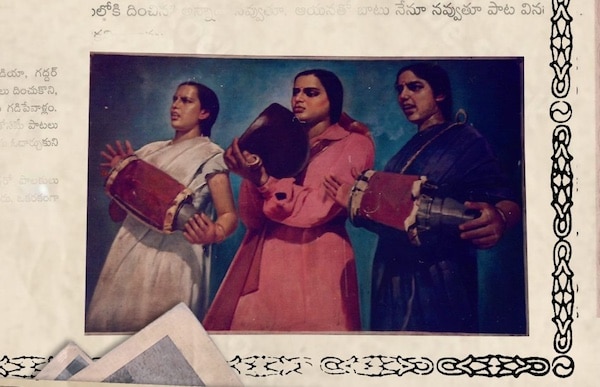Dear friends,
Greetings from the desk of Tricontinental: Institute for Social Research.
Mallu Swarajyam (1931—2022) was born with an appropriate name. From deep within the mass movement against British colonialism that was initiated by India’s peasants and workers, and then shaped by M. K. Gandhi into the movement for swaraj (self-rule), Bhimireddy Chokkamma drew her baby daughter into the freedom movement with a powerful name that signaled the fight for independence. Born into a house of reading, and able to get books through the radical people’s organisation Andhra Mahasabha, Mallu Swarajyam obtained a Telugu translation of Maxim Gorky’s Mother (1907). The book was one of many titles that were translated in the Soviet Union, part of that country’s great gift to the cause of literacy around the world and circulated by the communists in India. Gorky’s novel revolves around a mother, Pelageya Nilovna Vlasova, and her son, Pavel Vlasov. The mother works in a factory, the brutal father dies, and the son eventually becomes involved in revolutionary activities. The mother worries for her son but soon begins to read the socialist literature that he brings home and also immerses herself in revolutionary activities. This book had a marked impact on Mallu Swarajyam’s life, which she recounted in her 2019 memoir (as told to Katyayini and Vimala), Naa Maate. Tupaki Tuta(‘My Word Are Like Bullets’).
Having read this book at the age of ten, Mallu Swarajyam was inspired the next year to join the call by the Andhra Mahasabha to fight against bonded labour. She decided to break the barriers of caste and to distribute rice to bonded labourers in her town. ‘My own uncles were against my giving rice to bonded labourers’, she recounted. ‘But I was firm that they deserved their share. And my gesture set a precedent in the entire area where bonded labourers started to demand pay for their work’. Her mother supported these efforts, much like Pelageya Nilovna Vlasova supported Pavel Vlasov in Mother. These early experiences prepared Mallu Swarajyam for the rural uprising that would shake the Telugu-speaking region of India between 1946 and 1951 and is known as the Telangana movement.
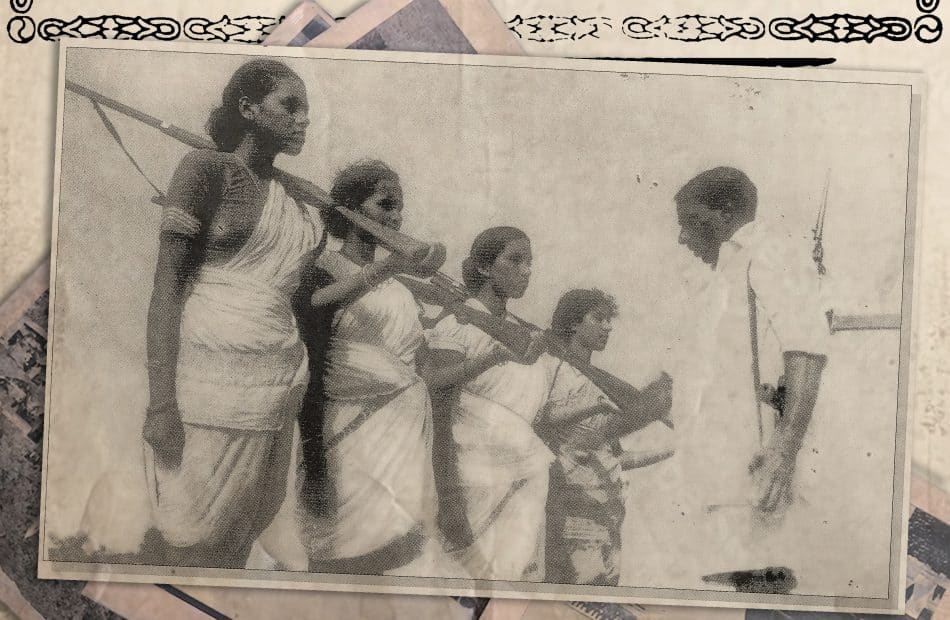
Mallu Swarajyam, a communist revolutionary hero (left), with other women fighters of the armed struggle in the late 1940s. (Photo: Sunil Janah)
Mallu Swarajyam’s radicalisation took her into the emergent peasant movement and the attempt to build the communist party. She threw herself into the work of organising the peasantry in her district and soon across the entire region. When the uprising began, she was named as commander of a dalam (a fighting force), her speeches known as fired bullets. The landlords gathered to place a bounty on her head, offering a reward of Rs. 10,000—a regal sum of money at the time. But she was undaunted, becoming one of the most beloved young leaders of the armed struggle.
Years later, Mallu Swarajyam recounted her experiences in the organisation of the peasants during the 1940s. Women and oppressed-caste Dalits would fill the village air at night with songs of the oppressed as they worked to de-husk rice. The songs were about god and their lives. ‘Under the moonlight’, Swarajyam recalled, the singing was so beautiful that even ‘people who were asleep enjoyed these songs’. These songs were derived from folk art traditions prevalent in Telugu society such as various forms of storytelling that use song and theatre to re-enact performances of Harikatha (the Hindu mythology of Lord Vishnu), Pakir patalu (a trove of Sufi songs), Bhagavatam (stories from the Sanskrit epic Mahabharata), as well as non-religious practices such as Burrakatha and Gollasuddulu, both of which tell stories of workers and peasants with two drums accompanying the singer. It was in these musical forms that the workers and peasants contested the worldview of the dominant castes. And it was in this part of the popular imagination that the Left intervened very early in the struggle for social transformation. When Mallu Swarajyam went to at least thirty villages to start the revolt, she said, ‘I started a revolutionary fire in the people with the song as our vehicle. What more did I need?’.
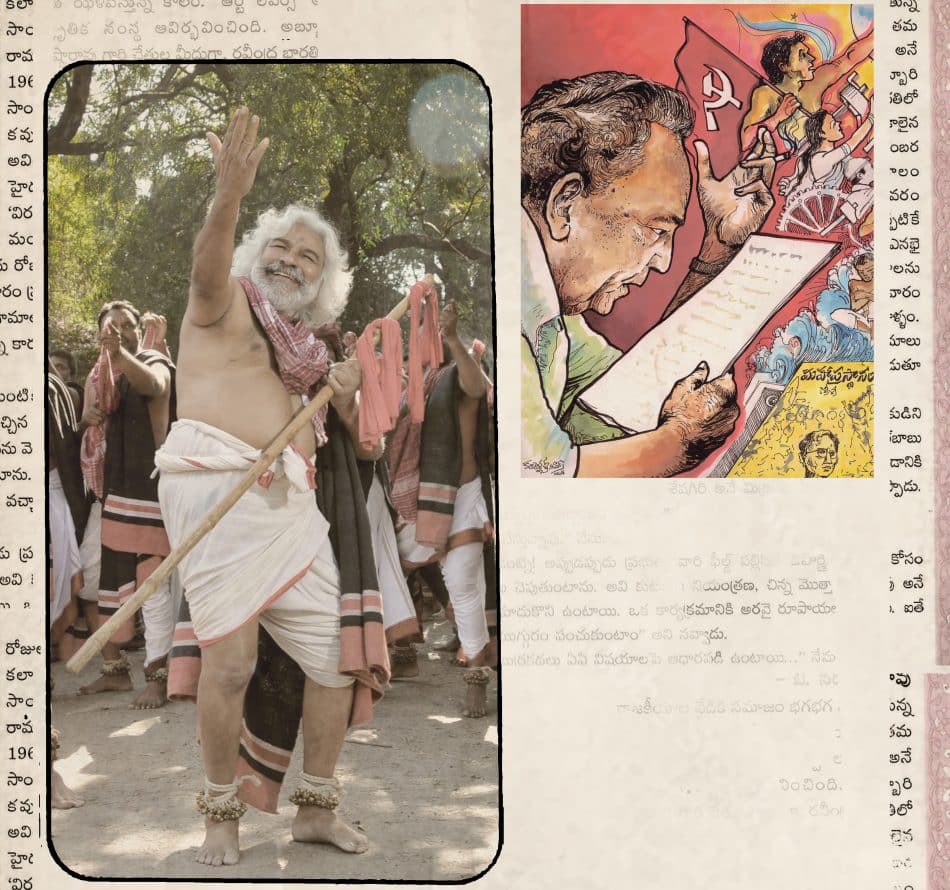
Left: Gummadi Vithala Rao, popularly known as Gaddar, one of the most influential Telugu-speaking revolutionary songwriters, performs for spectators, first by singing and dancing to a line in his songs and then pausing to explain its political and historical significance. (Photo: KN Hari)
Right: Telugu poet Srirangam Srinivas Rao, popularly known as Sri Sri, reads a poem from his anthology Maha Prasthanam (Forward March), yellow cover featured on the bottom right, to marchers joining the struggle to fight for another under the red flag (back right). (Photo: Kurella Srinivas, 2009)
At the heart of our most recent publication—The Telugu People’s Struggle for Land and Dreams (dossier no. 80, September 2024)—is the relationship of culture to peasant and working-class radicalism. In areas of high illiteracy and colonial education systems, it was impossible to transmit a new world view only through the written word or through cultural forms that were alien to the world of the people. Songs and theatre became the forms for political conversation in places such as India, China, and Vietnam. In Vietnam, the Communist Party formed propaganda teams (Doi Tuyen Truyen Vo Trang) that went amongst the people and through plays and songs mobilised the villages to participate in the liberation struggle. In China, the history of taking plays into rural areas goes back to the 1930s; during the Yan’an decade (1935—1945), the Communist cultural troupes began to perform ‘living newspaper’ concerts, a practice developed by the Soviets in the 1920s, in which the actors would improvise plays based on events in the news. Street theatre, songs, wall paintings, magic lantern shows: these became the textbooks of revolutionary activity. Our dossier attempts to highlight the world of songs as a part of the history of socialist culture.
The songs of these revolutionaries, built on peasant ballads and forms, crafted the elements of a new culture: in their words, they rejected the hierarchies of the countryside and in their rhythm, they allowed the peasantry to lift up their voices louder than they often did in the presence of the landlords. Both the content and the form of these songs encapsulated the boldness of a new world.
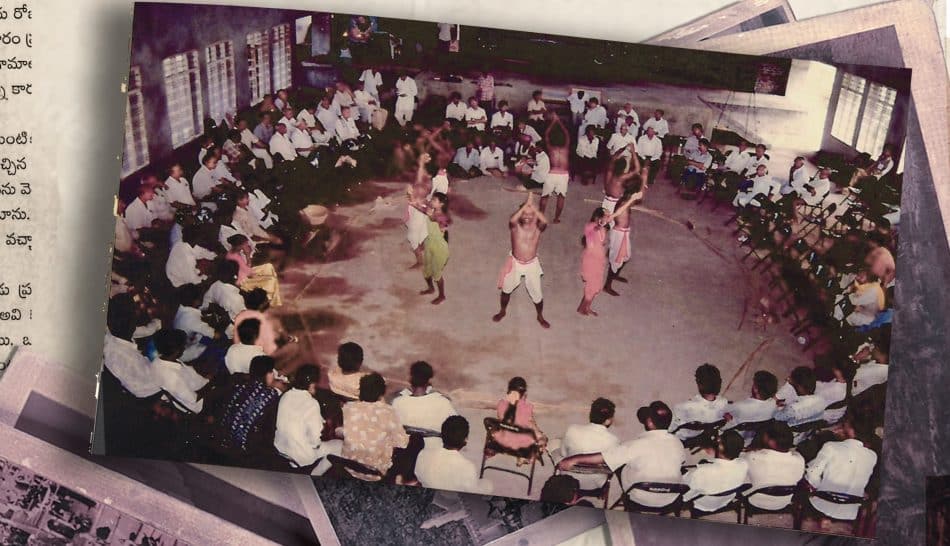
Praja Natya Mandali performs a street play. (Photo: Praja Natya Mandali Photography Archives)
The histories of these cultural actions and the transformations they engendered are often forgotten—the suppression of these histories plays a political role in our time. It was clear that the communist artists of the 1940s closely studied the earlier peasant songs and the history of rebellion embedded in them; they then took that history and developed it further, frequently using new, vibrant rhythms to recount the revolutionary history of the peasants and workers. Songs of the history of resistance build on the past to create their own, new histories. This is the dialectical spiral of culture, a lifting up of memories of past struggles to inspire new struggles, whose memory in turn stimulates newer struggles; each set of struggles pushing the cultural forms to the edge of their own possibility, building new confidence in the people whose sense of themselves has been diminished by old hierarchies and by old poverty.
Our dossier hopes to bring part of that history to light, which is indeed very much along the grain of the work of our art department (for more of this kind of archival and theoretical work, I recommend that you subscribe to the Tricontinental Art Bulletin, initiated in March and published on the last Sunday of each month).
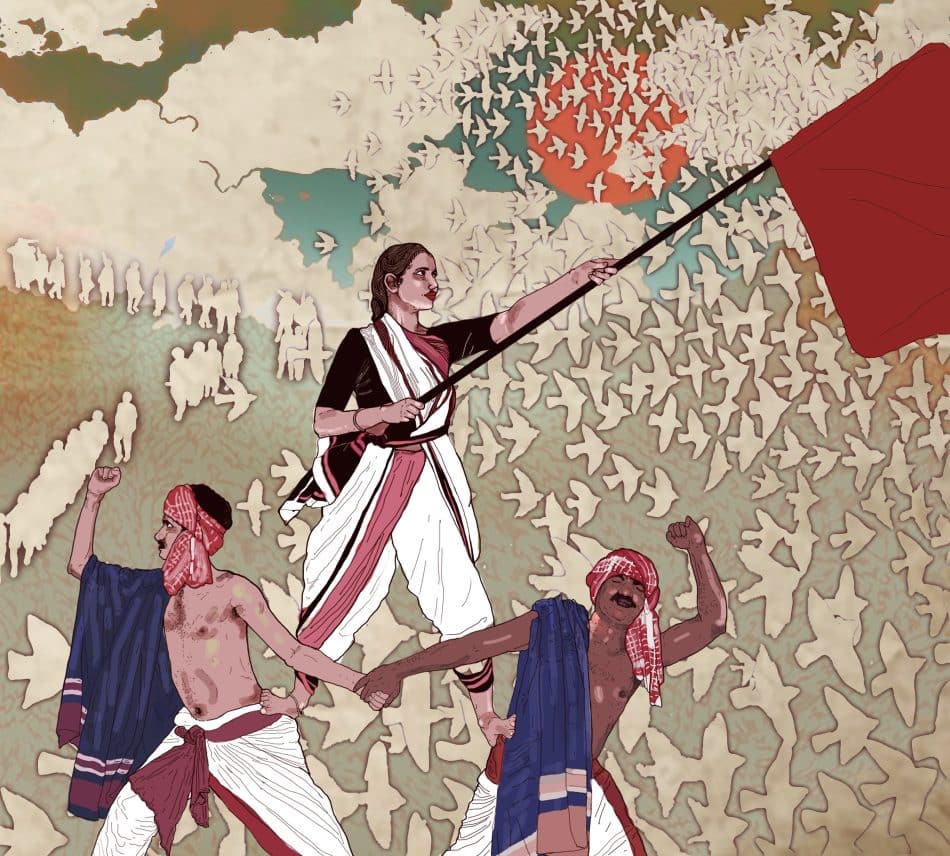
This collage includes photographs of the street play Veera Telangana (Heroic Telangana) taken in the 2000s by Praja Natya Mandali and photographs of a troop (dalam) of the armed struggle marching in the late 1940s taken by Sunil Janah).
Khalida Jarrar (born 1963) is a Palestinian leader of the Popular Front for the Liberation of Palestine and elected member of the Palestinian Legislative Council. A brave and kind person, Jarrar has been in the crosshairs of the Israeli military occupation forces for decades. She has been frequently arrested and held in administrative detention, often with no charge (the first time was in 1989 when she was arrested at an International Women’s Day march in Palestine). Since 2015, she has spent as much time in prison as she has outside of it, with increasingly longer terms behind bars. In prison, Jarrar became an important voice for women prisoners and organised political schools for her fellow inmates. In 2020, from Israel’s Damon prison, Khalida Jarrar smuggled out a letter which was delivered as a speech by her daughters at the Palestine Writes Literature Festival; it speaks about the importance of cultural work amongst the inmates:
Books constitute the foundation of life in prison. They preserve the psychological and moral balance of the freedom fighters who view their detentions as part of the overall resistance against the colonial occupation of Palestine. Books also play a role in each prisoner’s individual struggle of Will between them and the prisons’ authorities. In other words, the struggle becomes a challenge for Palestinian prisoners as the jailors seek to strip us from our humanity and keep us isolated from the outside world. The challenge for prisoners is to transform our detention into a state of a ‘cultural revolution’ through reading, education and literary discussions.
When I read Jarrar’s speech, I was struck by one sentence. She wrote: ‘Maxim Gorky’s novel Mother became a comfort to women prisoners who are deprived of their mothers’ love’. That Jarrar and other Palestinian woman prisoners would experience in 2020 the same sort of sentiments that Mallu Swarajyam experienced in the 1940s with the reading of Mother is extraordinary. It reminds us of the power of certain kinds of fiction to lift the spirits and inspire us to act in ways that we could otherwise not easily imagine.
On 11 July 2021, during one of Jarrar’s periods of confinement in Israel’s prisons, her daughter Suha died. The Israelis rejected Jarrar’s application to attend Suha’s funeral. Grief-stricken, Jarrar wrote a poem to mourn her child,
Suha, my precious.
They have stripped me from giving you a final kiss.
I send you a flower as a goodbye.
Your absence pains me, sears me.
The pain is excruciating.
I remain steadfast and strong,
Like the mountains of beloved Palestine.
Poems, songs, novels, plays: fiction that in the dialectical spiral inspires us to act and then to depict our actions, which in turn inspires others to act and then to write their stories.
Since October 2023, the Israelis have hardened their treatment of Palestinian prisoners, and brought in thousands of new Palestinian political prisoners into already overcrowded prisons. The conditions are now deadly. Khalida Jarrar’s most recent words from prison, published on 28 August, are heartbreaking. During a visit from lawyers of the Commission of Detainees and Ex-Detainees Affairs and the Palestinian Society Prisoners’ Club, she sent the following message:
I am dying every day. The cell resembles a closed small can. There is a toilet in the cell and a small window above, which was closed after one day. They left us no way to breathe. There is a narrow vent that I sat next to most of the time to breathe. I am really suffocating in my cell, waiting time to pass, hoping to find oxygen to breathe and stay alive. The high temperature increased the tragic condition of my isolation, as I feel myself existing in an oven. I can’t sleep due to the high temperature, and they intended to cut off the water in the cell, and when I asked to refill my bottle of water, they bring it after four hours at least. They let me out to the prison’s courtyard only once after eight days of isolation.
We stand in full solidarity with Khalida Jarrar. We will translate our latest dossier into Arabic and send it to her so that she can read the songs of the Telangana heroes and take inspiration from them.
Warmly,
Vijay

